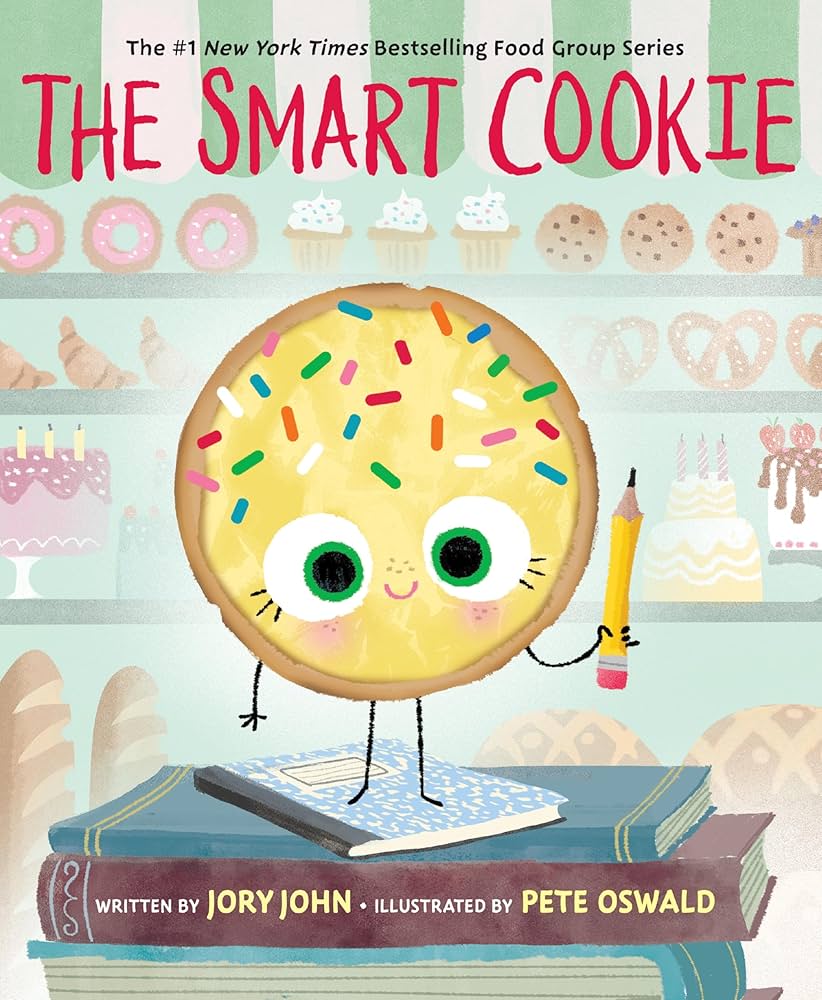The Smart Cookie
Book Module Navigation
Summary
The Smart Cookie tells the story of a cookie who doesn’t feel smart—especially compared to the other sweets in the bakery. Timid and self-doubting, Cookie struggles with reading aloud, solving puzzles, and answering questions quickly. But with the encouragement of a kind teacher and the opportunity to write a poem, Cookie discovers a different kind of intelligence—one rooted in creativity and self-expression. The story challenges conventional ideas about what it means to be “smart,” suggesting a broader, more inclusive view of intelligence that values perseverance, emotional insight, and imagination.
Discussion Guidelines
The Smart Cookie opens the door to meaningful philosophical inquiry into the nature of intelligence, the sources of self-worth, and the role of community in shaping our identities. While the book uses light humor and gentle storytelling, it raises serious questions about how we define and value human capabilities.
The story encourages students to consider: What does it really mean to be smart? Is intelligence something you’re born with, or something you can grow over time? Philosophers and educators alike have challenged narrow definitions of intelligence as limited to logic, speed, or correctness. This book gives children a chance to explore broader, more inclusive views of intelligence that include creativity, emotional awareness, perseverance, imagination, and the ability to connect with others.
The book also encourages reflection on how our self-concept is formed. Cookie initially sees themself as “not smart,” largely because of how others perform or are praised. This brings up questions about comparison, competition, and the role of recognition in our sense of value. Students can consider how we come to believe certain things about ourselves, and how those beliefs can change with new experiences and supportive relationships.
Finally, The Smart Cookie prompts a discussion about justice and inclusion: Why are some forms of intelligence celebrated more than others? Is it fair to treat students differently based on how quickly they learn or how confidently they speak up? Can a fair community recognize and celebrate many different kinds of strengths?
Discussion Questions
Intelligence and Self-Understanding
- What does Cookie think being “smart” means at the beginning of the story?
- How does Cookie’s idea of “smart” change by the end?
- Do you think writing a poem makes Cookie smart? Why or why not?
Different Kinds of Smarts
- Can someone be smart in art but not in math? Or in kindness but not in reading?
- What are some different ways people can show they’re smart?
- Is it fair to say everyone is smart in their own way?
Learning and Growth
- What helped Cookie start to feel more confident?
- Have you ever struggled to learn something new? What helped you keep going?
- Is making mistakes part of being smart? Why or why not?
Community and Encouragement
- How did Cookie’s teacher support them?
- How can we help others who feel like they aren’t smart?
- Do we need other people to help us see what we’re good at?
Suggested Activity: Poetry Café
After discussing the story and Cookie’s experience of discovering a new kind of intelligence through writing, invite students to reflect on their own strengths and what makes them feel capable or “smart.” Begin by explaining that, like Cookie, we all have unique abilities—some that others notice right away, and some that we might not even recognize in ourselves until we try something new.
Ask students to write a short poem that expresses what makes them special, or the kinds of intelligence they value in themselves. To help them get started, you might offer a few sentence prompts to spark ideas, such as “I feel smart when…,” “I’m the kind of smart that…,” or “My brain is good at…” Encourage students to focus on qualities they’re proud of—whether it’s kindness, creativity, curiosity, persistence, imagination, or something else entirely. Emphasize that there are no right or wrong answers, and that all contributions are welcome.
Once students have completed their poems, transform the classroom into a cozy and inviting “Poetry Café” space. Dim the lights if possible, arrange chairs in a circle or semicircle, and invite students to read their poems aloud to the group. You might play soft background music, offer simple refreshments like crackers or fruit, or add decorative touches like a tablecloth or “candle” centerpieces to create a warm and encouraging atmosphere.
As each student shares, model active listening and supportive feedback, reinforcing the idea that every poem is a meaningful expression of who they are. After the reading, hold a class reflection in which students can talk about how it felt to share their work and what they noticed about others’ strengths. Highlight how diverse and wonderful the range of intelligences in the room is, and connect the experience back to Cookie’s journey in the book.
This activity reinforces the message that intelligence takes many forms and that everyone has something valuable to contribute. It also nurtures empathy, confidence, and appreciation for one another’s unique voices.






